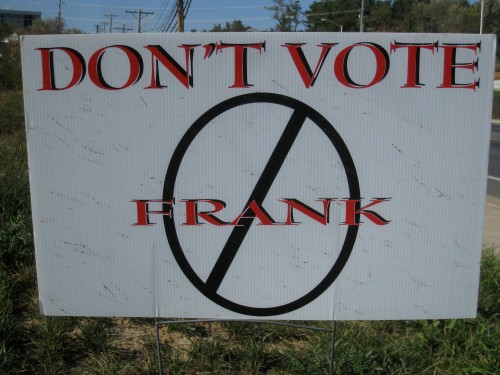I spent a good part of Saturday digging through boxes of old stuff that I’ve picked up over the years and it is quite amazing the stuff I found. There are stacks of books, bumper stickers (Dole/Kemp baby!), yard signs, and employment rejection letters from members of Congress. How many of you can say you have a letter signed by Idaho’s disgraced former Senator Larry Craig or one where former Representative Virgil Goode spells your name incorrectly? But one of the most interesting items is a one page political brief written by yours truly. Unfortunately, I cannot recall why I wrote it. The only clues as to its purpose are its title and the fact that it bears my social security number. Although I’d change quite few things if I were writing it today, I want to share my early political thoughts with you. Again, these words are coming from thirteen years in the past, not today, though I have slightly modified a bit of the spacing, punctuation, and added just a few words for easier reading and clarification.
One social controversy that interests me greatly is the subject of abortion. After spending much time researching the subject, I have written two essays on the subject and one poem. Let me state that I am in the camp referred to as “Pro-life.” I believe that abortion is wrong and should only be used when the mother’s life is in danger or the child is a product of rape or incest.
One concept needed when analyzing the issue of abortion is the question, “When does life begin?” I believe that life begins at conception of sperm and ovum. Now if we were to consider the question in terms of biology, the biologists’ school of thought states that a cell is the simplest unit of life. There is no argument that when the two units combine, they form a single-celled organism. Therefore, according to biology, this single-celled unit is, in fact, a living creature. However, I find this case not to be true. When I took biology in 10th grade, my teacher actively encouraged the practice of abortion and thought the procedure can be used to create “organ farms” that can be harvested in order to help humans with failing organs. Although I do not deny that doing so would help many individuals with health problems, I object to the process of killing children so that others may live. Not only that, my teacher went on to say that this process is not wrong because the fetus is not alive anyway. This [viewpoint] strikes me as hypocrisy. How can my teacher, who holds a college degree in biology, claim that organ farms would cause no problems because the fetus was not alive anyway? Even though I wished to confront him publicly about his misconceptions, I unfortunately did not have the courage. Since then, I have become much more self confident and assertive thus earning the rank of “most opinionated” senior.
Another problem facing us in the abortion dilemma is the idea of morality. I consider myself a very moral person and like to promote my moral values to others. When thinking of abortion as the killing of a human, then my belief system would forbid the practice of abortion. I believe that all human beings are created by and in the image of God[;] therefore to kill a human would be a mortal sin. My religion also dictates my above belief that life begins at conception as stated in Psalms 139. It seems to me that since this country was founded on the motto, “In God we trust,” it is incomprehensible as to why this country has taken such a moral backslide.
Now, although some who heard my earlier speeches about abortion might think I am some kind of extremist, I say that this [claim] is not true. I have no plans to picket [neither] abortion clinics nor plant bombs in them. In essence, the people who commit such [murderous] acts are no better than the abortion doctors themselves. What good would come from the killing of another human life? It would only renew tensions between the pro-life and pro-choice camps. Instead, I think any such wars over abortion should take place in the floor of the United States Congress. This [conflict] would result in less death and violence and would be legal. In any case, I am opposed [to] the idea of abortion by my moral and scientific beliefs.
So what do you think of the 17 year old activist Joshua? Moved at all by his words? I should point out that although you might assume that he was opposed to the death penalty, I assure you he was (and still is) an avid supporter of the practice. In addition, my position on abortion has changed slightly and I no longer view picketing abortion clinics as extreme. Personally, I’m amazed at the folly of youth. Back in those days, I thought a Bible verse and a bit of data were all you needed to win the day. We have discovered that such tactics are grossly insufficient. For the record, “In God We Trust” did not become the nation’s official motto until 1956. And do any political poets even exist in the modern age? Moving on, although I lamented my trepidation then, I regret to say that it still holds me back even today to some extent. I think Thucydides gets it right in his History of the Peloponnesian War when he writes, with some people “ignorance makes them brave and thinking makes them cowards”.
Well, I hope you’ve enjoyed this look into my political past. I’d like to say my writing has improved with thirteen years of practice. Back then I had such high hopes for the future. Unfortunately, those dreams have been horribly weakened by waves of political decay and moral relativity. Will I be as passionate in 2028? I’ll let you know when we get there.







